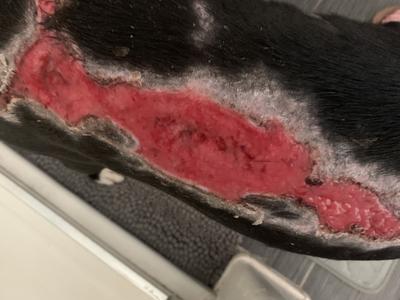Possible Causes and Treatment of Large Sore on a Dogs Back
My dog has a large sore on his back that reoccured twice now, and has blistered once. We suspect that it’s an allergic reaction to cactus, but it is localized despite him being pricked elsewhere. We have been using saline baths with medical shampoo, anti-itch spray and anti-fungal, along with over the counter antibiotics, and in the first 48 hours Benadryl for allergic reaction, but I don’t know what it is exactly. Also worried he has a weak immune system in general.
Editor suggestions for causes and treatment of a large sore on dog's back
Skin issues can be due to various underlying conditions that require professional diagnosis and treatment by a veterinarian.
The image you provided shows shows a large, reddened sore on your dog's back with the skin around the sore appearing to be inflamed, and the central area looking raw. Given its appearance, the issue seems severe and warrants immediate veterinary attention.
When you meet with the veterinarian, here are some possibilities to discuss:
Allergic Dermatitis:
Allergic reactions could be localized, especially if the dog was in prolonged contact with the allergen in that specific area.
While it's possible that the sore could be a reaction to cactus, the severe and localized nature of the symptom is not typically what one would expect from a simple contact allergen like cactus spines. Allergic reactions to plants usually manifest as generalized itching or hives rather than isolated, severe sores. If your dog had been pricked elsewhere by the cactus but didn't develop similar lesions, that might further suggest that the issue is not solely due to a cactus allergy.
If you suspect a cactus allergy, your veterinarian may still consider it as part of a differential diagnosis, but given the severity and recurrence
The most likely cause appears to be a bacterial (Pyoderma, which is a bacterial infection often appearing as sores or pustules on the skin) or fungal infection (These can often look similar to bacterial infections but require a different treatment approach), possibly secondary to some other underlying condition. These types of infections can produce localized, severe sores and are often recurrent if not adequately treated. The fact that the sore has recurred and blistered suggests that this is more than a simple allergic reaction or irritation.
Autoimmune Disorders: If the issue has recurred and infection is ruled out, it could potentially be an autoimmune skin disorder, but these are relatively rare.
Your approach of using saline baths, medical shampoos, and over-the-counter antibiotics is a good first-aid measure, but it may not be enough, especially if the issue is recurrent.
Recommendations:
Visit a Veterinarian: This is crucial for a definitive diagnosis and targeted treatment.
Skin Tests: Your vet may recommend skin tests or biopsies to determine the exact cause.
Immunotherapy: If allergies are confirmed, immunotherapy could be a long-term solution.
Prescription Medication: A vet may prescribe stronger antibiotics, antifungals, or other medications based on the diagnosis.
If you're concerned about a weak immune system, consult your vet about diet and supplements that can boost immunity.
Again, consult a qualified veterinarian for a diagnosis and treatment plan tailored to your dog's specific needs.
Please keep us up to date on your dog's condition.
Jeff
Editor and Publisher
Dog Health Guide
Please note: This information is intended to complement, not replace, the advice of your pet's veterinarian. Always consult a vet for professional medical advice about your pet's health.
Join in and write your own page! It's easy to do. How? Simply click here to return to Skin.


